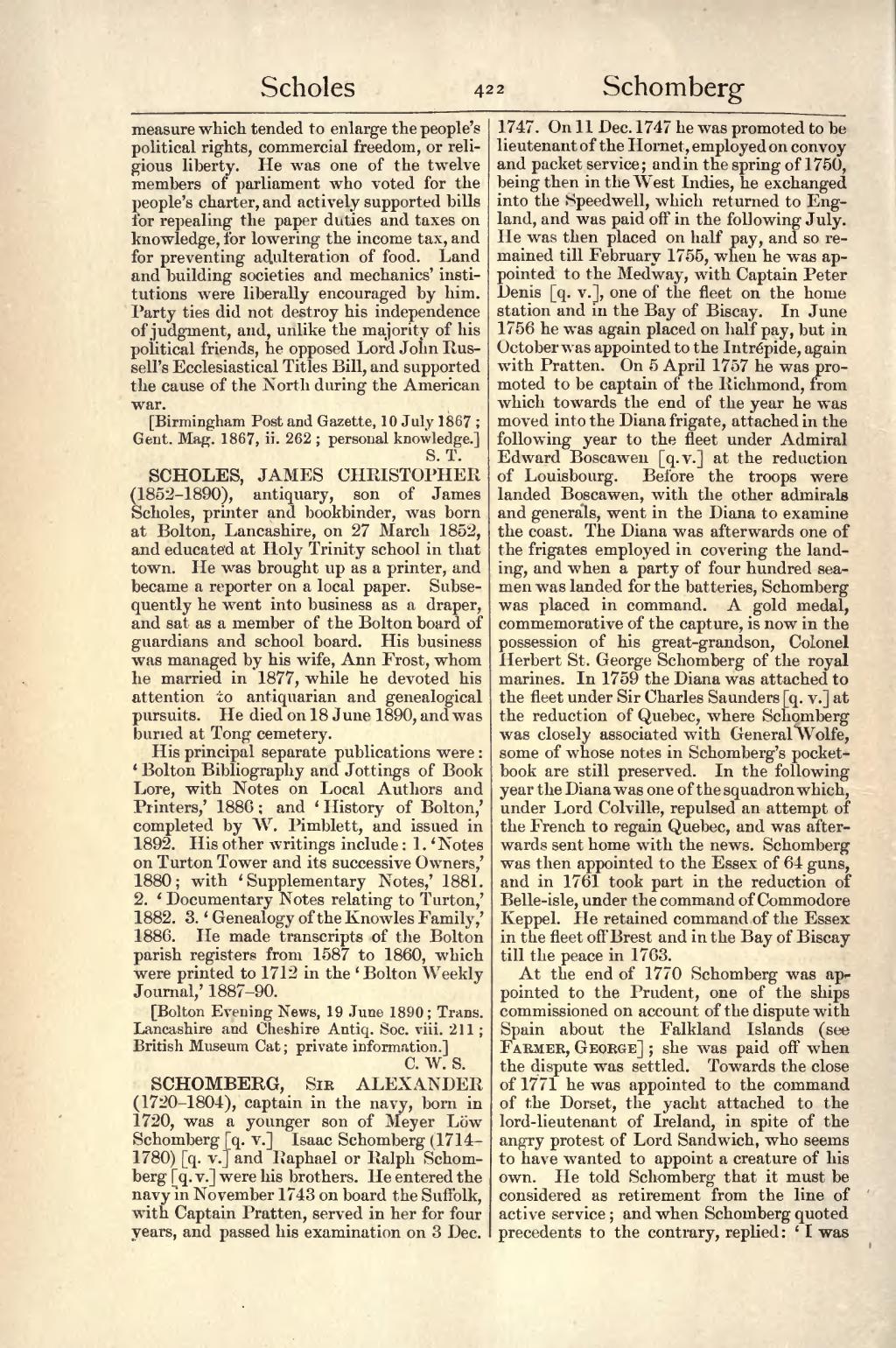measure which tended to enlarge the people's political rights, commercial freedom, or religious liberty. He was one of the twelve members of parliament who voted for the people's charter, and actively supported bills for repealing the paper duties and taxes on knowledge, for lowering the income tax, and for preventing adulteration of food. Land and building societies and mechanics' institutions were liberally encouraged by him. Party ties did not destroy his independence of judgment, and, unlike the majority of his political friends, he opposed Lord John Russell's Ecclesiastical Titles Bill, and supported the cause of the North during the American war.
[Birmingham Post and Gazette, 10 July 1867; Gent. Mag. 1867, ii. 262; personal knowledge.]
SCHOLES, JAMES CHRISTOPHER (1852–1890), antiquary, son of James Scholes, printer and bookbinder, was born at Bolton, Lancashire, on 27 March 1852, and educated at Holy Trinity school in that town. He was brought up as a printer, and became a reporter on a local paper. Subsequently he went into business as a draper, and sat as a member of the Bolton board of guardians and school board. His business was managed by his wife, Ann Frost, whom he married in 1877, while he devoted his attention to antiquarian and genealogical pursuits. He died on 18 June 1890, and was buried at Tong cemetery.
His principal separate publications were: ‘Bolton Bibliography and Jottings of Book Lore, with Notes on Local Authors and Printers,’ 1886; and ‘History of Bolton,’ completed by W. Pimblett, and issued in 1892. His other writings include: 1. ‘Notes on Turton Tower and its successive Owners,’ 1880; with ‘Supplementary Notes,’ 1881. 2. ‘Documentary Notes relating to Turton,’ 1882. 3. ‘Genealogy of the Knowles Family,’ 1886. He made transcripts of the Bolton parish registers from 1587 to 1860, which were printed to 1712 in the ‘Bolton Weekly Journal,’ 1887–90.
[Bolton Evening News, 19 June 1890; Trans. Lancashire and Cheshire Antiq. Soc. viii. 211; British Museum Cat; private information.]
SCHOMBERG, Sir ALEXANDER (1720–1804), captain in the navy, born in 1720, was a younger son of Meyer Löw Schomberg [q. v.] Isaac Schomberg (1714–1780) [q. v.] and Raphael or Ralph Schomberg [q. v.] were his brothers. He entered the navy in November 1743 on board the Suffolk, with Captain Pratten, served in her for four years, and passed his examination on 3 Dec. 1747. On 11 Dec. 1747 he was promoted to be lieutenant of the Hornet, employed on convoy and packet service; and in the spring of 1750, being then in the West Indies, he exchanged into the Speedwell, which returned to England, and was paid off in the following July. He was then placed on half pay, and so remained till February 1755, when he was appointed to the Medway, with Captain Peter Denis [q. v.], one of the fleet on the home station and in the Bay of Biscay. In June 1756 he was again placed on half pay, but in October was appointed to the Intrépide, again with Pratten. On 5 April 1757 he was promoted to be captain of the Richmond, from which towards the end of the year he was moved into the Diana frigate, attached in the following year to the fleet under Admiral Edward Boscawen [q. v.] at the reduction of Louisbourg. Before the troops were landed Boscawen, with the other admirals and generals, went in the Diana to examine the coast. The Diana was afterwards one of the frigates employed in covering the landing, and when a party of four hundred seamen was landed for the batteries, Schomberg was placed in command. A gold medal, commemorative of the capture, is now in the possession of his great-grandson, Colonel Herbert St. George Schomberg of the royal marines. In 1759 the Diana was attached to the fleet under Sir Charles Saunders [q. v.] at the reduction of Quebec, where Schomberg was closely associated with General Wolfe, some of whose notes in Schomberg's pocket-book are still preserved. In the following year the Diana was one of the squadron which, under Lord Colville, repulsed an attempt of the French to regain Quebec, and was afterwards sent home with the news. Schomberg was then appointed to the Essex of 64 guns, and in 1761 took part in the reduction of Belle-isle, under the command of Commodore Keppel. He retained command of the Essex in the fleet off Brest and in the Bay of Biscay till the peace in 1763.
At the end of 1770 Schomberg was appointed to the Prudent, one of the ships commissioned on account of the dispute with Spain about the Falkland Islands [see Farmer, George]; she was paid off when the dispute was settled. Towards the close of 1771 he was appointed to the command of the Dorset, the yacht attached to the lord-lieutenant of Ireland, in spite of the angry protest of Lord Sandwich, who seems to have wanted to appoint a creature of his own. He told Schomberg that it must be considered as retirement from the line of active service; and when Schomberg quoted precedents to the contrary, replied: ‘I was
